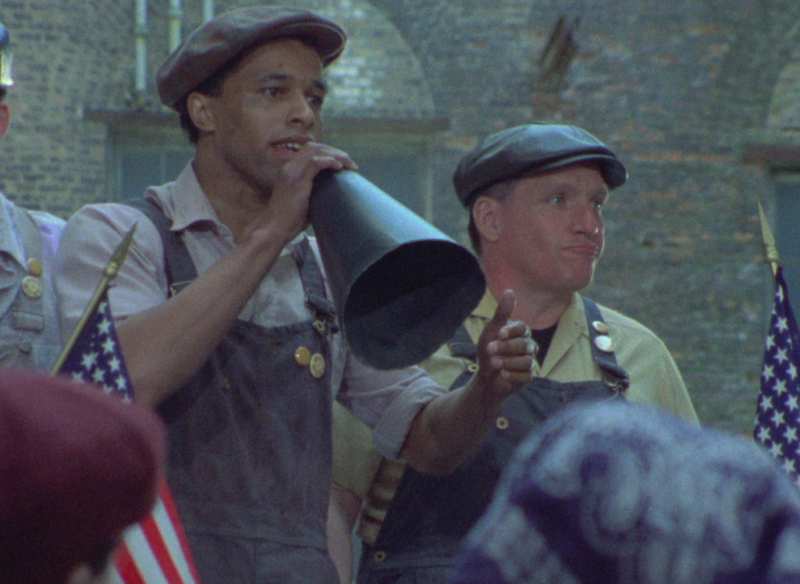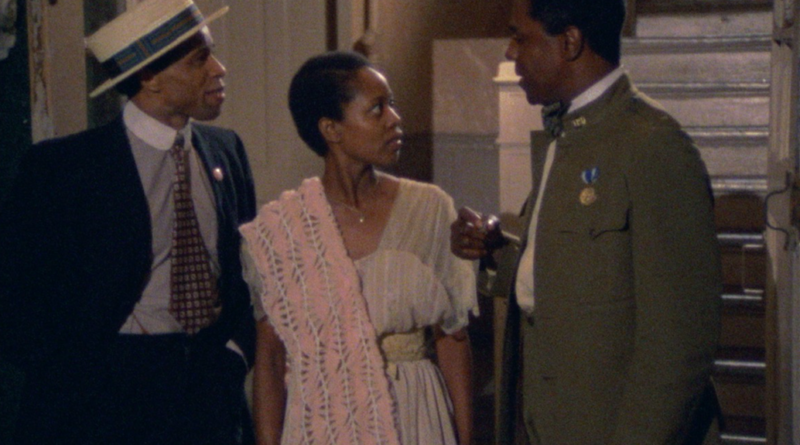INTERVIEW: Bill Duke’s ‘The Killing Floor’ is as timely as ever
Photo: The Killing Floor, directed by Bill Duke, has recently been re-released virtually thanks to Film Movement. Photo courtesy of Film Movement / Provided by Foundry Comm with permission.
The Killing Floor, a feature-length film directed by Bill Duke, premiered in 1984 on PBS’ American Playhouse series and then went on to engage audiences at the Cannes and Sundance film festivals. The movie, according to press notes, tells the story of Black and white slaughterhouse workers who attempted to build an interracial union in the Chicago stockyards. The workers, including the protagonist Frank Custer (Damien Leake), face racism, opposition and violence, but they are determined to gain respect and labor rights.
The film, which is now 35 years old and also stars Alfre Woodard and Moses Gunn, feels as prescient and powerful as ever. In 2020, Film Movement has decided to showcase the modern classic in its virtual cinema, and Duke, an accomplished director, couldn’t be happier that a whole new generation of audience members — many of them impacted and influenced by the current protests and news stories — will experience his influential movie and this historic tale.
“Very, very fortunately and unfortunately it’s still relevant,” Duke said in a recent phone interview. “It deals with a Black nuclear family. To a certain extent, it deals with what we’re facing now — unemployment, it deals with unions, it deals with racial topics. A lot of things have changed, to a certain extent, but not as fully as we want it to as demonstrated by these protestors.”
Duke remembers the mid-1980s and the environment in which The Killing Floor was created. Harold Washington was recently elected the first African-American mayor of Chicago, and there were celebrations in the street.
“The time was a time of rejuvenation,” Duke remembers. “And when I read the script, I really wanted to be a part of developing it, and Elsa Rassbach, who was the producer, she was really open to suggestions. And so it was a great collaboration between the writer, myself and Elsa and the wonderful cast. It was a positive time.”
Duke, who also directed A Rage in Harlem, Deep Cover and The Cemetery Club, conducted a lot of research on Chicago, its politics, its union history and the contributions of African-Americans to the city’s life and workforce.
“Chicago as it evolved and [most] importantly as the unions evolved and how the unions went from a segregated entity into an integrated entity — that was fascinating to me,” he said. “If you see near the end, they’re marching together, Blacks and whites. If you look out there today, you’ll see the same thing.”

The movie met with great acclaim and stands as one of the strongest bullet points on Duke’s impressive résumé — a résumé that also includes Sister Act 2: Back in the Habit, America’s Dream, Hoodlum and the more recent Created Equal. Still, despite the acclaim, Duke sometimes has a tough time watching what he created.
“As a director, I’m a perfectionist,” he said with a laugh. “No matter what work it is, I could have done something better, or I wish I had more time. But I think all directors are that way mostly. You really want it to be not only good; you want it to be as perfect as you can make it. So, there are things that I looked at and wanted to make more perfect, but the thing is we had so much time and so much budget and shooting in Chicago at that time. And we did the best that we could. I really enjoyed what finally came out, but I’m like that with all of my films.”
Duke has also been a successful actor for many years in Hollywood. His roles have included everything from Leon James in American Gigolo to Sgt. Mac Eliot in Predator to Secretary Bolivar Trask in X-Men: The Last Stand. He currently has a recurring role on The CW’s Black Lightning. He enjoys both directing and acting, and sees each artistic endeavor as having different satisfactions.
“They’re both collaborative, in the sense that if you’re an actor you’re working with the director and helping manifest the vision of that director,” he said. “I love directing because it’s two disciplines. One is aesthetic where you collaborate with the writer and the producers, and you put together this vision that you have to translate. … The other aspect of directing is management. You’re really managing three things. You’re managing time, people and money, and if you have the ability to do that and still manifest your vision, that’s … just very rewarding.”
Throughout his time in Hollywood, Duke has faced barriers and overcome many obstacles. He opened several doors for Black directors and actors, but it wasn’t always easy. He remembers his first time directing an episode of Dallas, the hit TV show.
“I was the first Black director on Dallas,” he said. “I was going into the set and into the studio. … Had a briefcase and a little suit jacket and tie. I wanted to be impressive, the first Black director, so I go over to the gate. I roll down my window, and the security guard looks in the window and says to me, and I’m quoting now, ‘Who are you delivering for?’ I said, ‘What’d you say?’ He said, ‘Who are you delivering for?’ I said, ‘No, no, no.’ I wanted to say, ‘I’m about to deliver a can of whoopass to you,’ but I didn’t say that because I would have been the angry Black man in Hollywood. What I ended up saying to him was, ‘I’m the first Black director on Dallas, and I’m delivering my talent. Could you please open the gate?’ And the most satisfying thing about that was the look on his face.”
Eventually more opportunities came Duke’s way, and today he looks back at his many decades of directing and acting with a grateful eye. He recognizes the obstacles and is proud to have overcome them, leaving his art and his life’s work for generations to appreciate.
“I will say I’m grateful,” Duke said. “I’m grateful to God for giving me the opportunities. I am grateful for other people who believed in me. I’m grateful for the support I got from the community. I’m grateful for the talent God gave me, and so it’s more gratitude than anything else. I am proud of the work I’ve done, and I’m also grateful because I don’t think I’m finished yet. There’s some projects I’m working on now that I hope will even transcend what I’ve done. You’re always in the process. I never want to retire because I love what I do. I enjoy it very much.”
By John Soltes / Publisher / John@HollywoodSoapbox.com
The Killing Floor, directed by Bill Duke, is now available virtually from Film Movement. Click here for more information.

